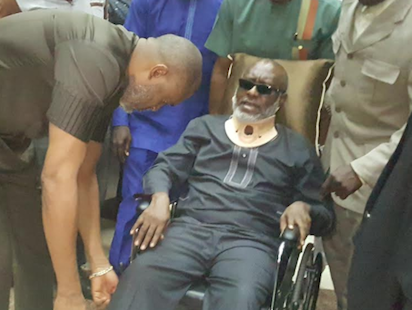Metuh v. Federal Republic of Nigeria [2018] 3 NWLR (Pt. 1605) 1 at 83 paras. F-G, per Ige, JCA:
“The refusal to grant the application on the sundry findings of the learned trial Judge against the appellant as heretofore alluded, is unfair to the appellant because it violates his right to obtain the attendance in court as witness for appellant, Colonel Mohammed Sambo Dasuki (Rtd.) whose name featured prominently in the charge against the appellant and who was alleged to have enabled the transfer of the funds to the appellant. Col. Sambo Dasuki is no doubt an essential witness for the appellant.”
Notes:
The ongoing trial of the Appellant before Abang J. of the Federal High Court, Abuja, is one of the most popular corruption cases in this Buhari administration.
The facts leading to this appeal is that the Appellant had applied for subpoena to be issued compelling Col. Sambo Dasuki to appear as a witness for the Appellant in the case. Dasuki was alleged to be the one who transferred the sum of N400 Million to the Appellant in his capacity as the then National Security Adviser to the former President Jonathan and his name featured in counts 1, 2, 3, 4, and 7 of the charge. Notwithstanding, the Respondent did not deem it necessary to call Dasuki as a witness. The Respondent however filed no objection to the application for subpoena. Regardless, the learned trial Judge refused the application. Aggrieved, the Appellant appealed to the Court of Appeal who allowed the appeal.
In determining the appeal, the Court of Appeal considered the reasons advanced by Abang J. in refusing the Appellant’s application. The trial Judge reasoned that the application was made in bad faith because:
- The Appellant did not initially include the name of Dasuki in his List of Witnesses.
- The Appellant did not inform the court at what stage he changed his mind to call Dasuki to testify for him.
- The Appellant had already called 6 witnesses.
- The Appellant has not even testified in the matter.
Contrary to the position of the Judge, it is trite that parties to a case have the right to apply to call additional witness and same must be considered on the merit. Section 256 of the Administration of Criminal Justice Act 2015 (ACJA) provides for the right to call or recall a witness at any stage of the proceedings. It is also trite that an accused person is not bound to testify for himself. This right is constitutionally guaranteed. On the whole, the Court of Appeal found the reasons advanced by the trial Judge as baseless and concluded that the application for subpoena was not made in bad faith. Ige, JCA said:
“I am of the solemn view and this is with considerable respect to the learned trial Judge that all the above listed reasons as pontificated upon by the trial Judge are highly tenuous, puerile, and extraneous for a just determination of the Appellant’s application and this culminated in the failure on the part of the trial Judge to sign the subpoena applied for and refusal of the application made by the Appellant.” See page 78 of the report.
The Court of Appeal held, amidst Respondent’s arguments to the contrary, that Dasuki is a competent and compellable witness and that given the facts of the case and allegations tabled, Dasuki’s presence as a witness was necessary and that it does not lie in the mouth of the trial Court to hold that his appearance in court will not serve any useful purpose.
It was also strongly contended, and upheld by the trial Court, that the Appellant failed to show attempts he made to secure the attendance of Dasuki before applying for subpoena. It is worthy of note that Dasuki has been in the custody of the Directorate of State Security Services. The Court of Appeal discountenanced the contention holding that no such evidence of attempts made was required before an application for subpoena can be made and granted.
Another reason advanced by the trial Court in holding that the application for subpoena was made in bad faith was that it would further delay the hearing of the matter. The Court of Appeal was not persuaded. It held that “expeditious hearing devoid of fair hearing is not a fair trial”. The Court further held that there was no evidence that the Appellant was involved in any dilatory tactics and that importantly, if the trial Judge had signed the subpoena applied for at the material time, this appeal would not have arisen. Therefore, time would have been saved.
One other significant point made by the Court of Appeal is that the right to apply for a subpoena is not only statutorily provided for under ACJA, Section 241(1) thereof, but the right is also a constitutional right as contained in Section 36(6)(b)(d) of the 1999 Constitution (as amended).
The Court of Appeal interpreted the provisions of the said Section 241(1) ACJA to mean that the court has a mandatory duty to grant an application for subpoena duly filed. Thus, it is not a purely discretionary matter. The word, “May”, used in the subsection was held to mean, “Shall”. The learned trial Judge erroneously believed that he had absolute discretion on the issue. Even if that be the case, it is submitted that discretion must always be judicially and judiciously exercised. It amounts to injudicious exercise of discretion to disallow an application for subpoena duly filed as in this case.
A fortiori, Section 36(6)(b)(d) of the Constitution provides that a person charged with a criminal offence is entitled to be given adequate time and facilities for the preparation of his defence and also to obtain the attendance and carry out the examination of witnesses to testify on his behalf. According to the Court of Appeal, refusal to grant an application for subpoena in deserving cases (such as in the instant case) is a breach of the constitutional right to fair hearing and particularly, a violation of these subsections of the Constitution.
It is submitted that our courts should not be in a hurry to convict an accused person or allow itself to conduct trials with a body language showing that the accused person is already guilty as charged before conclusion of the case.
In recent times, we have seen that lawyers who file frivolous appeals are being made to suffer for it by paying costs personally. Now, what do we do with Judges who cause the filing of meritorious but avoidable appeals by their illogical and unreasonable decisions?
Image credit: Vanguard.














